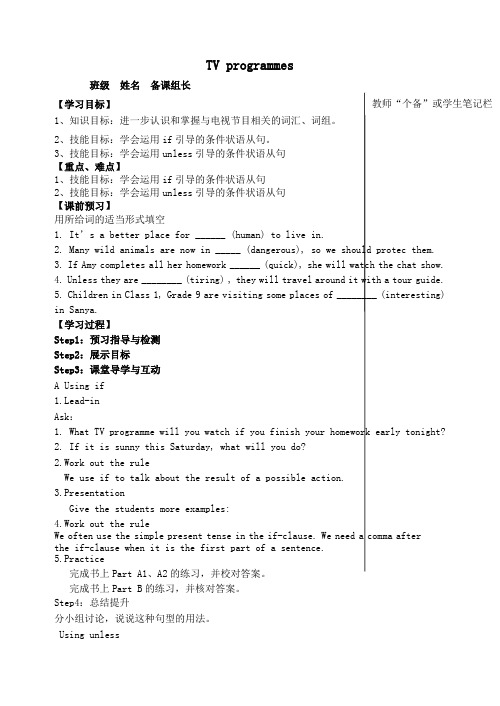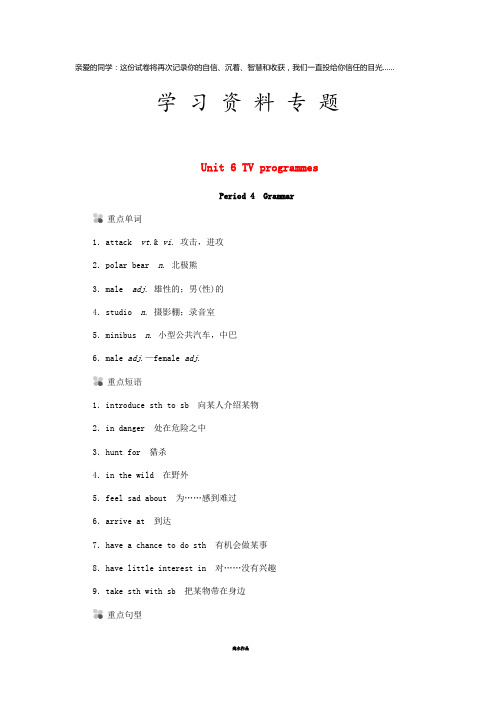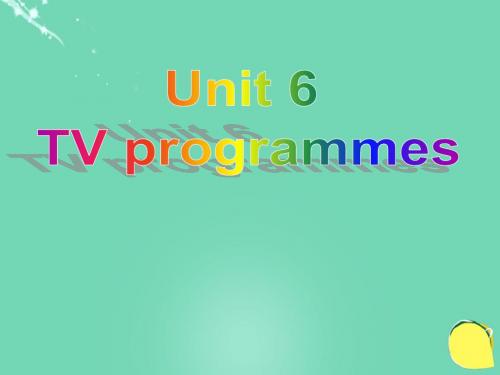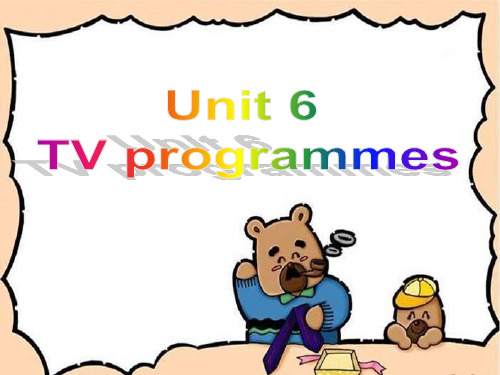九年级英语上册《Unit 6 TV programmes Grammar II》教案
九年级英语上册Unit6TVprogrammesGrammar导学案(无答案)(新版)牛津版

TV programmes班级姓名备课组长1、知识目标:进一步认识和掌握与电视节目相关的词汇、词组。
2、技能目标:学会运用if引导的条件状语从句。
3、技能目标:学会运用unless引导的条件状语从句【重点、难点】1、技能目标:学会运用if引导的条件状语从句2、技能目标:学会运用unless引导的条件状语从句【课前预习】用所给词的适当形式填空1. It’s a better place for ______ (human) to live in.3. If Amy completes all her homework ______ (quick), she will4. Unless they are ________ (tiring) , they will travel around5. Children in Class 1, Grade 9 are visiting some places ofin Sanya.【学习过程】Step1:预习指导与检测Step2:展示目标Step3:课堂导学与互动A Using if1.Lead-inAsk:2. If it is sunny this Saturday, what will you do?2.Work out the ruleWe use if to talk about the result of a possible action.3.PresentationGive the students more examples:4.Work out the ruleWe often use the simple present tense in the if-clause. We need the if-clause when it is the first part of a sentence.5.Practice完成书上Part A1、A2的练习,并校对答案。
牛津译林版九年级上册Unit 6《TV programmes》(Grammar)教学设计

牛津译林版九年级上册Unit 6《TV programmes》(Grammar)教学设计一. 教材分析本课选自牛津译林版九年级上册Unit 6《TV programmes》,主要讨论电视节目。
本课的主要语法点是现在进行时态的运用,同时涉及到一般现在时态的复习。
教材通过电视节目的介绍,让学生在具体的情境中学习并运用现在进行时态,从而达到熟练掌握的目的。
二. 学情分析九年级的学生已经掌握了基本的英语语法知识,对于一般现在时态有一定的了解。
但是,对于现在进行时态的运用还存在一定的困难。
因此,在教学过程中,需要通过具体的情境和大量的练习,让学生在实际操作中掌握现在进行时态的用法。
三. 教学目标1.知识目标:–能正确运用现在进行时态描述正在进行的动作。
–能正确运用一般现在时态描述经常发生的动作。
2.能力目标:–能听懂、说出一般现在时态和现在进行时态的句子。
–能在日常生活中运用所学知识进行交流。
3.情感目标:–激发学生学习英语的兴趣。
–培养学生的团队合作意识。
四. 教学重难点•现在进行时态的构成和用法。
•一般现在时态的复习。
•现在进行时态和一般现在时态的区分和运用。
五. 教学方法1.情境教学法:通过电视节目的情境,让学生在实际语境中学习并运用现在进行时态。
2.任务型教学法:通过小组合作完成任务,让学生在实践中掌握语法知识。
3.交际法:通过角色扮演、小组讨论等活动,让学生在交流中学习语法。
六. 教学准备1.教材和课件。
2.电视节目的图片或视频。
3.练习题。
4.录音机或多媒体设备。
七. 教学过程1.导入(5分钟)通过提问方式引导学生谈论他们喜欢的电视节目,激发学生的兴趣。
2.呈现(10分钟)展示一些电视节目的图片或视频,让学生猜测这些节目是什么。
在呈现过程中,教师用现在进行时态描述学生正在看的电视节目。
3.操练(10分钟)学生分组,每组选择一个电视节目,用现在进行时态描述这个节目。
然后,各组互相交换,听其他组描述的节目,并猜出是哪个节目。
牛津译林版九年级上册Unit 6《TV programmes》(Task)教学设计

牛津译林版九年级上册Unit 6《TV programmes》(Task)教学设计一. 教材分析牛津译林版九年级上册Unit 6《TV programmes》主要介绍电视节目的类型及特点。
通过本单元的学习,学生能够掌握电视节目的分类,运用所学语言描述不同类型的电视节目,提高他们的语言运用能力。
本单元还包括了关于电视节目的调查,以培养学生的合作意识和解决问题的能力。
二. 学情分析九年级的学生已经具备了一定的英语基础,能够运用英语进行简单的交流。
但部分学生在英语表达上仍存在一定的困难,需要教师在教学中给予关注和指导。
此外,学生对于电视节目的兴趣各不相同,因此在教学过程中,教师需要充分调动学生的积极性,引导他们参与到课堂活动中来。
三. 教学目标1.知识目标:学生能够掌握电视节目的分类,学会用英语描述不同类型的电视节目。
2.能力目标:学生能够在日常生活中运用所学语言进行交流,提高他们的语言运用能力。
3.情感目标:培养学生对电视节目的兴趣,增强他们的合作意识。
四. 教学重难点1.重点:电视节目的分类及用英语描述不同类型的电视节目。
2.难点:电视节目相关词汇和表达方式的掌握,以及如何在实际语境中运用。
五. 教学方法1.任务型教学法:通过设定各种任务,引导学生主动参与课堂活动,提高他们的语言运用能力。
2.合作学习法:分组进行调查和讨论,培养学生的合作意识和团队精神。
3.情境教学法:创设各种真实的语境,让学生在实践中学习和运用英语。
六. 教学准备1.教材:牛津译林版九年级上册Unit 6《TV programmes》2.多媒体设备:投影仪、电脑、音响等3.教学课件:根据教学内容设计的课件4.调查表:用于学生分组调查电视节目的类型和特点七. 教学过程1.导入(5分钟)利用多媒体展示不同类型的电视节目图片,引导学生进行话题讨论,激发他们的学习兴趣。
2.呈现(10分钟)教师通过课件呈现电视节目的分类,让学生初步了解本节课的内容。
九年级英语上册Unit6TVprogrammes(第4课时)Grammar教案(新版)牛津版

Let students know that we use if to talk about the result of a possible action and then get them make some sentences with the word if on page 84.
Unit 6 TV programmes
课题及内容
Grammar
总课时数
7
教学
目标
1.学会运用if引导的条件状语从句。
2.学会运用unless引导的条件状语从句。
教学
重、难
点
1.学会运用if引导的条件状语从句。
2.学会运用unless引导的条件状语从句。
教学设计
Teaching procedures:
Step5:Show"Guide Three"to the students.
Guide Three______
Let the students know that we can use the word unless to say that something can only happen or be true in a particular situation,and then do the exercises on page 86.
Let's have a match and see who can do it best.
Step4:Show"Guide Two"to the students.
Guide Two________
Do the exercise in Part A1 and Part A2 .
牛津译林版英语九年级上册Unit6 TV programmes Grammar课件

A. How dangerous the scene B. What dangerous a scene
C. How a dangerous scene D. What a dangerous scene
New words
1. 攻击,进攻 v. 2. 北极熊 n. 3. 雄性的,男性的 adj. 4. 雌性的,女性的 adj. 5. 摄影棚;录音室 n. 6. 小型公共汽车,中巴 n.
attack polar bear male female studio
minibus
1. The manw_a_s__at_t_ac_k_e_d(攻击) by a snake while walking through the rainforest.
2. _P_o_l_a_r b_e_a_r_s__ live mainly on fish from the water.
favourite cartoon.
3. If Amy _c_o_m__p_le_t_e_s_(completes, will complete) all her homework quickly, she __w_i_l_l _w_a_tc_h__ (watches, will watch) the chat show.
If 从句用一般现在时
主句含有情态动词 may/might + do
主句为祈使句
Let's change the following sentences:
If hunters catch a giant panda, they will kill it for fur. = They will kill it for fur if hunters catch a giant panda. We can go and fly the kite if it is fine tomorrow. = If it is fine tomorrow, we can go and fly the kite.
九年级英语上册Unit6TVprogrammesGrammar学案

Unit6 Grammar一、教学目标1.知识目标:进一步认识和掌握与电视节目相关的词汇、词组。
2.技能目标:学会运用if引导的条件状语从句。
3.技能目标:学会运用unless引导的条件状语从句教学重点、难点正确运用if和unless引导的条件状语从句二、词汇、短语1.win a prize 赢得一个奖 winner 获奖者2 introduce sth to sb 向某人介绍3 have a chance to do 有机会做某事4 . complete (vt) all her homework 完成她所有的家庭作业 complete(adj):完全的5 live as a family 群居生活6 travel around it with a guide. 导游带领旅游7have little interest in it. 对它几乎没兴趣 interested ,interesting8 hunt for their own food寻找他们自己的食物9 take an umbrella带把雨伞 take sth with sb随身携带某物if作为连词,引导条件状语从句,它表示的意思是“假如”“如果”等。
在复合句中如果主句用将来时,则if引导的状语从句用一般现在时。
例如:1. If it doesn’t rain, we will go to the park next Sunday. 如果天不下雨,下周星期天我们将去公园。
2. If you ask him,he will help you.如果你求他,他将会帮助你。
3.If you are a football fan, you may feel sad about it.4.If a bear is in danger, it will attack people.Unless = if ... not unless在意义上可以理解为if…not,在有些情况下两者可以互换使用。
九年级英语上册 Unit 6 TV programmes Period 4 Grammar听读本 (新版)牛津版

亲爱的同学:这份试卷将再次记录你的自信、沉着、智慧和收获,我们一直投给你信任的目光……学习资料专题Unit 6 TV programmesPeriod 4Grammar重点单词1.attack vt.& vi. 攻击,进攻2.polar bear n. 北极熊3.male adj. 雄性的;男(性)的4.studio n. 摄影棚;录音室5.minibus n. 小型公共汽车,中巴6.male adj.—female adj.重点短语1.introduce sth to sb 向某人介绍某物2.in danger 处在危险之中3.hunt for 猎杀4.in the wild 在野外5.feel sad about 为……感到难过6.arrive at 到达7.have a chance to do sth 有机会做某事8.have little interest in 对……没有兴趣9.take sth with sb 把某物带在身边重点句型1.If Sandy finds a programme interesting, she will introduce it to us.如果桑迪发现一个有趣的节目,她会把它介绍给我们。
2.Unless you try your best, you will not realize your dream.除非你尽你最大的努力,否则你将不会实现你的梦想。
公交小句1.I won't go to the party unless I'm invited.除非我被邀请,否则我不会去参加聚会的。
2.If you have much interest in English, you will find it very interesting. 如果你对英语非常有兴趣,你就会发现它非常有趣。
3.It's going to rain and you'd better take an umbrella with you.快要下雨了,你最好身边带把伞。
九年级英语上册 Unit 6 TV programmes Grammar教案 (

TV programmes教学目标知识目标To make sure the students understand the use of to-infinitives forpurpose.To be able to use verbs + objects + to-infinitives to make sentences. 能力目标To make sure the students understand the use of to-infinitives forpurpose.To be able to use verbs + objects + to-infinitives to make sentences. 情感目标To make sure the students understand the use of to-infinitives forpurpose.To be able to use verbs + objects + to-infinitives to make sentences.教学重点the use of to-infinitives教学难点the use of to-infinitives教学设计Teaching aids: A computer, notebooks and work sheets. a calendaTeaching methods: Listening 、reading、acting& Discussing教学过程教师活动内容、方式学生活动备注(个性化设计) Step1 PresentationTranslation1.他来上海拜访他的朋友。
2.政府应该立法来保护野生生物。
3.为了省钱,她每天回家吃午饭。
4.为了赢得下个月的比赛,他们每天刻苦训练。
Use these sentences to give the students some examples about to-infinitives for purpose. TranslatePresentStep 2 Introduce the uses of to-infinitives for purposeWe can use to-in finitives to express purpose.e.g. I often go to the market to watch birds.Now the Chinese government has made laws to prevent all these things.We can also use in order to to express purposes. This is more formal t han to-infinitives.e.g. Some peop le want to make the wetlands smallerin order to have more space for farms and buildings.Take a notebook with you in order to wri te down what you see. Learn the uses ofto-infinitives forpurpose Learn the uses ofto-infinitivesfor purpose1.Match the first parts of the sentences on theleft with theDo exercises Exercises 教师活动内容、方式学生活动备注(个性化设计) second parts on the right.Write the correct letters in the blanks.(Page 73)2.More exercises1.我呆在那儿看看会发生什么。
新译林版英语九年级上册第六单元Grammar

_a_t_ta_c_k_ people.
Dad: What will a polar bear do if it's hungry?
realize your dream. • You will be late unless you leave right
now.
unless引导的条件状语从句
unless引导条件状语从句: • Unless he studies hard, he will never
pass the exam.
如果你考试不及格,你会让他失望的。
• You will get good grades if you study hard. 如果你努力学习,就会取得好成绩。
在if引导的条件状语从句中,主句中的 动词常用一般将来时,从句中的动词用 一般现在时,即“主将从现”原则。
• If you ask him, he will help you. 如果你请他(帮忙),他会帮你的。
除非他刻苦学习,否则考试永远不能及格。
• We will not get there on time unless we leave earlier.
如果我们不早点离开,就不能准时到那里。
unless意思足“除非,如果不”,相当于 if…not。如: • You will be late unless you leave at once.
• They are going to have a picnic if they are free next Saturday. 如果下周六有空,他们就去野餐。
牛津译林版英语九上Unit 6《TV programmes》(Grammar)ppt课件2

5 Unless you are tired,
b ______
6 You will have a chance to see how a TV e programme is recorded, ______ b you will not need to take the minibus in the studio. e unless you have little interest in it.
Work out the rule! We often use the simple __________ present (future, present) tense in the if-clause. We need a comma _________ (comma, full stop) after the in-clause when it is the first part of a sentence.
Sometimes we can use if ... not to replace unless. e.g. The situation will continue unless humans stop hunting them for their fur and bones. → The situation will continue if humans do not stop hunting them for their fur and bones.
Asking about animals Millie watched a documentary about animals. Help Millie answer her father’s questions with the help of the words in the box.
Unit6TVprogrammes第3课时Grammar(件)九年级英语上册(牛津译林版)

Comparative and superlative adverbs
词尾变化 原级 比较级 最高级 单音节词在词尾 hard harder hardest 加-er(比较级)或- high higher highest est(最高级);以字 fast faster fastest 母e接尾的词加-r 或-st
Grammar C and D
Using ‘while’ and ‘as’ Comparative and superlative adverbs
‘While’ and ‘as’ are also conjunctions of time. Both ‘while’ and ‘as’ mean ‘during the time that’.
Ben gets up earlier than his lazy father. 2. 他们现在比以前过的更幸福。
They now live more happily than before.
副词比较级+副词比较级,意为“越 来越……” 1. 雨下得越来越大。
It rained more and more heavily. 2. 你学习越来越努力了。
词尾变化 原级 比较级 最高级
多音节词 slowly more most
和多数双 carefully slowly slowly
音节词在 quickly
more most carefully carefully
其前面加
more most
more和
quickly quickly
most
词尾变化 原级 比较级 最高级
The work should take us from two to
译林版初中英语九年级上册Unit6 TV programmes Grammar课时练习试卷及参考答案

译林版初中英语九年级上册Unit6 TV programmes Grammar课时练习试卷姓名班级得分一、单项选择(每小题1分,计15分)( )1. ---Look! There are some students basketball on the playground.---Yes. I often see them basketball there.A. play; playB. play; playingC. playing; playD. playing; to play ( )2. ______ we didn't win the basketball game, we were satisfied with our hard work.A. IfB. ThoughC. SinceD. Because( )3. There a basketball game next Monday. If it , we'll have to put it off.A. is going to have; will rainB. is going to have; rainsC. is going to be; rainsD. is going to be;will rain( )4. ---Would you like to go hiking if it fine this Saturday?---I'd love to. But nobody knows if it .A. is; will rainB. is ; rainsC. will be ; will rainD. will be; rains ( )5. In our school library there a number of books on science andthe number of the books growing.A. are; isB. is; areC. is; isD. are; are ( )6. We are covering these girls' wonderful performances.A. live; aliveB. alive; livelyC. live; livelyD. living; alive ( )7. You ______ walk on the wet hill path because you ________ fall and hurt yourself.A. must; might notB. mustn't; mightC. needn't; needD. must; must ( )8.--Has your father come back yet?--No. He come back this Sunday.A.doesn't; untilB. won't; afterC. doesn't; afterD. won't; until ( )9. More spelling mistakes and corrected if you go over the paper for the second time.A. are foundB. have been foundC. will be foundD. were found ( )10. ---It's said that the famous singer will hold a concert next month Xiangyang.---I'm sure the fans will be happy it's true.A. untilB. althoughC. beforeD. if ( )11. ---The radio says it these days in most parts in Jiangsu.---If it tomorrow, the PE exam will be cancelled.A. will rain; will rainB. will rain; rainsC. rains; will rainD. rains; rains( )12. Your dad has just fallen asleep. Don't wake him up it's really necessary.A. unlessB. orC. andD. but( )13.My grandmother ________ for about three years. I really miss her.A. has been diedB. has diedC. has deadD. has been dead ( )14. ---I will go swimming this afternoon, Peter.---If you go, so I.A. willB. doC. amD. have( ) 15. ---Tina wants to know if you to the park with us tomorrow.---I'd love to. But if it__________ , I may go to the library instead.A. go; will rainB. go; rainsC. will go; rainsD. will go;will rain二、词汇(每小题1分,计15分)A)根据句子意思,从方框中选用恰当的单词或短语填空,其中有一项是多余的。
- 1、下载文档前请自行甄别文档内容的完整性,平台不提供额外的编辑、内容补充、找答案等附加服务。
- 2、"仅部分预览"的文档,不可在线预览部分如存在完整性等问题,可反馈申请退款(可完整预览的文档不适用该条件!)。
- 3、如文档侵犯您的权益,请联系客服反馈,我们会尽快为您处理(人工客服工作时间:9:00-18:30)。
Unit6 TV programmes
GrammarII
Teaching goals:
1.知识与技能: 进一步认识和掌握与电视节目相关的词汇、词组
2.过程与方法: 学会运用unless引导的条件状语从句
3.情感、态度与价值观: 学会运用unless引导的条件状语从句
Important and difficult points:
1.知识目标:进一步认识和掌握与电视节目相关的词汇、词组。
2.技能目标:学会运用unless引导的条件状语从句
3.学会运用unless引导的条件状语从句。
Teaching procedures:
1.Lead-in Ask the students to translate the following sentences:
1. 除非下雨,否则我们明天要去公园。
(We will go to the park tomorrow unless it rains.)
2. 除非你帮我,否则在本月底之前我是完不成这项工作的。
(Unless you help me, I will not fini sh the work before the end of this month.)
2.Work out the rule
Sometimes we can use if… not to replace unless.
unless在意义上可以理解为if…not,在有些情况下两者可以互换使用。
如:
I can't see unless I wear glasses. (=I can't see if I don't wear glasses.)
Unless you can pay your bills, you’ll have to leave.
(=If you can't pay your bills, you’ll have to leave.)
从上面的例子可以看出,由于unless已经表达了if…not的含义,它所引导的条件状语从句只能使用肯定形式。
3.Ask the students to rewrite the sentences above using if … not.
1. We will go to the park tomorrow unless it rains.
2. Unless you help me, I will not finish the work before the end of this month.
4.Work out the rule
We often use the simple present tense in the unless-c lause. We need a comma after the
unless-clause when it is the first part of a sentence.
(1)主句为肯定句。
如:
You will miss the bus unless you hurry up.
You'll fail your Chemistry test again unless you work harder.
(2)主句为否定句或含有表示否定意义的词。
如:Unless you are friendly to people, you won't
get on well with them.
You will never get anywhere unless you set your goal.
5.Practice
完成书上相关的练习,并核对答案。
Step4:知识拓展
1. 在以when,before,as soon as等引导的时间状语从句,也适用“主将从现”原则,即如果主
句是一般将来时,从句用一般现在时I'll tell her the good news when she comes back. 当她回来的时候,我将把这个好消息告诉她。
She will give you a call as soon a s she returns.
她一回来就会给你电话。
2. If条件句==祈使句,and /or+将来时态的陈述句。
<同义句转换>Work hard, and you will make
great progress.
=If you work hard, you will make great progress.
Hurry up, or you will be late. =If you don’t hurry up, you will be late.
【Teaching reflection】。
